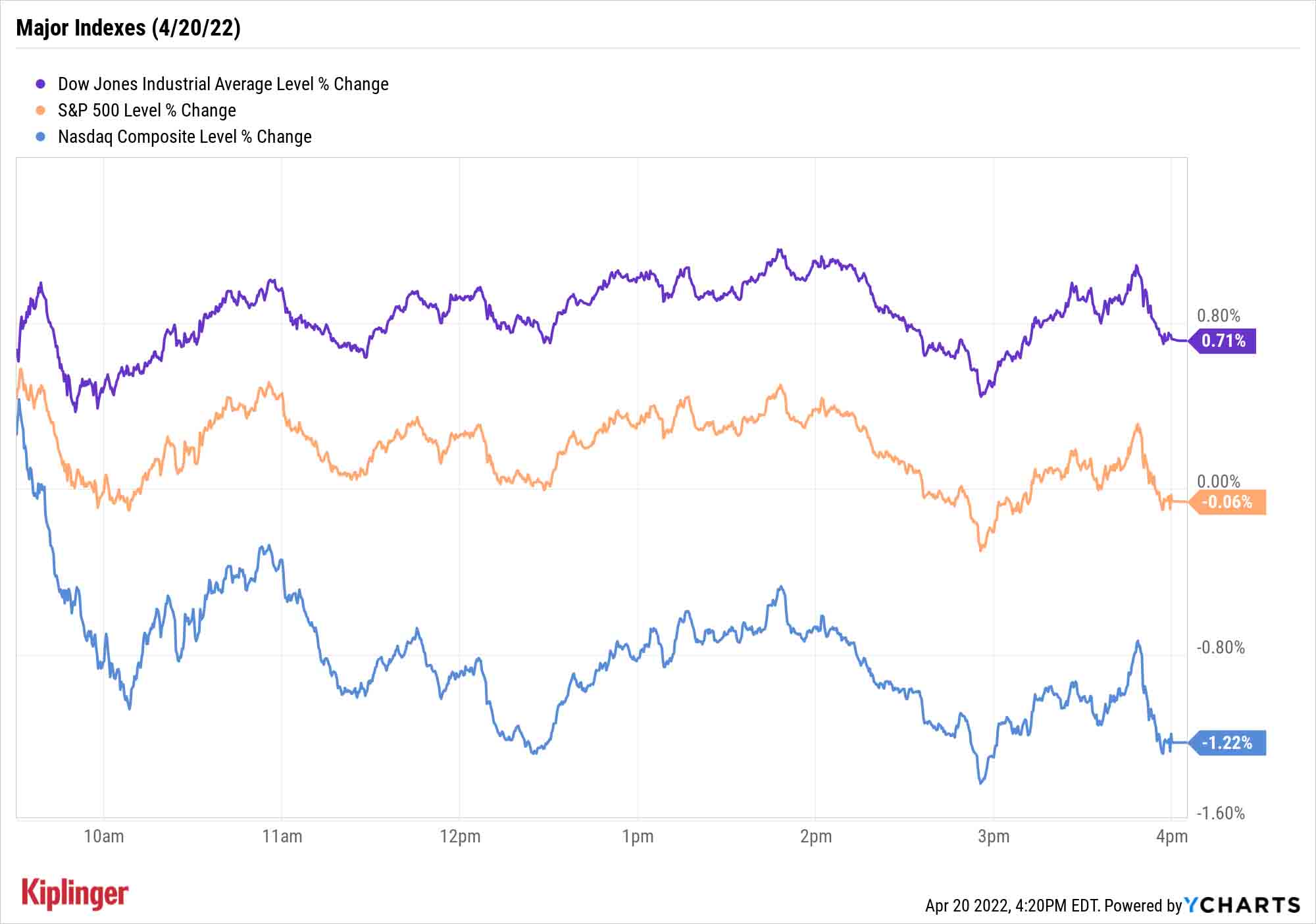Stock Market Today: Netflix's Epic Crash Clips Nasdaq
Rare subscriber loss hacks Netflix's value and weighs on its streaming rivals; Tesla reports Q1 beat after hours.


Profit and prosper with the best of Kiplinger's advice on investing, taxes, retirement, personal finance and much more. Delivered daily. Enter your email in the box and click Sign Me Up.
You are now subscribed
Your newsletter sign-up was successful
Want to add more newsletters?

Delivered daily
Kiplinger Today
Profit and prosper with the best of Kiplinger's advice on investing, taxes, retirement, personal finance and much more delivered daily. Smart money moves start here.

Sent five days a week
Kiplinger A Step Ahead
Get practical help to make better financial decisions in your everyday life, from spending to savings on top deals.

Delivered daily
Kiplinger Closing Bell
Get today's biggest financial and investing headlines delivered to your inbox every day the U.S. stock market is open.

Sent twice a week
Kiplinger Adviser Intel
Financial pros across the country share best practices and fresh tactics to preserve and grow your wealth.

Delivered weekly
Kiplinger Tax Tips
Trim your federal and state tax bills with practical tax-planning and tax-cutting strategies.

Sent twice a week
Kiplinger Retirement Tips
Your twice-a-week guide to planning and enjoying a financially secure and richly rewarding retirement

Sent bimonthly.
Kiplinger Adviser Angle
Insights for advisers, wealth managers and other financial professionals.

Sent twice a week
Kiplinger Investing Weekly
Your twice-a-week roundup of promising stocks, funds, companies and industries you should consider, ones you should avoid, and why.

Sent weekly for six weeks
Kiplinger Invest for Retirement
Your step-by-step six-part series on how to invest for retirement, from devising a successful strategy to exactly which investments to choose.
The earnings calendar was front and center Wednesday as a mixed session for the broader indexes was easily overshadowed by a plunge in of Wall Street's most notable mega-caps.
Netflix (NFLX) suffered its worst single-day decline in 18 years – a 35.1% nosedive eroding roughly $55 billion in market value – triggered by the company's first quarterly subscriber loss since 2011.
The streaming giant, which expected to add 2.5 million net subscribers during the first quarter, announced it had lost 200,000, triggering a flurry of analyst downgrades despite an easy earnings beat. The shortfall was in part caused by Netflix's decision to pull out of Russia, which cost it 700,000 subscribers, but inflation is also forcing customers worldwide to make tougher spending choices.
From just $107.88 $24.99 for Kiplinger Personal Finance
Become a smarter, better informed investor. Subscribe from just $107.88 $24.99, plus get up to 4 Special Issues

Sign up for Kiplinger’s Free Newsletters
Profit and prosper with the best of expert advice on investing, taxes, retirement, personal finance and more - straight to your e-mail.
Profit and prosper with the best of expert advice - straight to your e-mail.
CEO Reed Hastings also said NFLX was planning to launch an advertising-supported version.
"The initial allure of Netflix was that it didn't have any ads; it's unclear if Netflix fans will be amenable to advertisements," says David Trainer, CEO of investment research firm New Constructs. "Rivals like Disney can monetize content through a variety of other channels, like merchandise and theme park revenue. Netflix doesn't have the infrastructure for those kinds of revenue streams."
Ripples were felt throughout the streaming industry. Rivals including Disney (DIS, -5.6%), Amazon.com (AMZN, -2.6%), Warner Bros. Discovery (WBD, -6.0%), Paramount Global (PARA, -8.6%), Roku (ROKU, -6.2%) and even Chinese streamer iQiyi (IQ, -6.7%) all finished well in the red.
These losses weighed heaviest on the Nasdaq Composite, which declined 1.2% to 13,453. Faring relatively better were the S&P 500 (down marginally to 4,459) and Dow Jones Industrial Average (+0.7% to 35,160), which were buoyed by more positive earnings news.
International Business Machines (IBM, +7.1%) was the Dow's top component after it reported a 24% pop in profits and beat top- and bottom-line expectations.
"Stringing together consecutive quarters of outperformance illustrates that there is a clearer path to accelerating growth in 2022," says Morgan Stanley analyst Erik Woodring (Overweight, equivalent of Buy).
Meanwhile, price hikes helped Procter & Gamble (PG, +2.7%) offset inflation-pressured margins and deliver better-than-expected sales and profits.
Tesla (TSLA), off 5.0% during Wednesday's session, was up by roughly the same percentage following a Street-beating Q1 report. Earnings of $3.22 per share easily cleared estimates of $2.26, while revenues of $18.76 billion topped the consensus mark of $17.80 billion.

Other news in the stock market today:
- The small-cap Russell 2000 managed a 0.4% improvement to 2,038.
- U.S. crude futures edged up 0.1% to settle at $102.19 per barrel.
- Gold futures slipped 0.2% to finish at $1,955.40 an ounce.
- Bitcoin was relatively calm, sliding 0.3% to $41,243.10. (Bitcoin trades 24 hours a day; prices reported here are as of 4 p.m.
- Rite Aid (RAD) stock was up more than 38% at its intraday peak before paring its gain to 10.8%. Sparking the surge was a report in the New York Post that suggested the pharmacy chain rejected a late-March buyout bid from Spear Point Capital Management. According to the article, the private-equity firm offered to buy Rite Aid for $815 million, or $14.60 per RAD share – a 56% premium to its March 30 close at $9.36.
- Omnicom Group (OMC) jumped 4.5% after the advertising firm reported earnings. Despite suspending operations in Russia during the first quarter, OMC reported earnings $1.39 per share and revenue of $3.41 billion – more than the $1.30 per share and $3.29 billion analysts were expecting. CFRA Research analyst Janice Quek maintained a Buy rating on OMC stock, citing the company's "good cost control" and an upward revision to its organic growth forecast.
The Time to Buy Emerging Markets?
Inflation is hardly just an American problem.
Yesterday, the International Monetary Fund said inflation was a "clear and present danger" as it lowered its 2022 global GDP forecast by 0.8 percentage points, to 3.6%. And emerging markets are expected to struggle even more than developed economies as higher prices weigh heavy on commodity importers.
That in turn has meant even worse year-to-date returns for many emerging market (EM) stocks compared to their still struggling U.S. counterparts.
But this dip might prove an ideal buying opportunity for those wishing to brave the high potential (and high volatility) of EMs, especially given expectations for emerging market growth to recover in 2023.
If you want to take the plunge, you can spread out your risk across dozens or even hundreds of stocks from numerous countries through exchange-traded funds (ETFs). Or you can narrow your bet to a single region – for instance, these five stocks and funds allow you to harness the growth of Africa.
If you're looking for some of the most potent individual picks across the globe, however, look no farther than this cluster of 11 emerging-market stocks. We explore the opportunity each presents, and what about them stands out to stock-research experts.
Profit and prosper with the best of Kiplinger's advice on investing, taxes, retirement, personal finance and much more. Delivered daily. Enter your email in the box and click Sign Me Up.
Kyle Woodley is the Editor-in-Chief of WealthUp, a site dedicated to improving the personal finances and financial literacy of people of all ages. He also writes the weekly The Weekend Tea newsletter, which covers both news and analysis about spending, saving, investing, the economy and more.
Kyle was previously the Senior Investing Editor for Kiplinger.com, and the Managing Editor for InvestorPlace.com before that. His work has appeared in several outlets, including Yahoo! Finance, MSN Money, Barchart, The Globe & Mail and the Nasdaq. He also has appeared as a guest on Fox Business Network and Money Radio, among other shows and podcasts, and he has been quoted in several outlets, including MarketWatch, Vice and Univision. He is a proud graduate of The Ohio State University, where he earned a BA in journalism.
You can check out his thoughts on the markets (and more) at @KyleWoodley.
-
 Nasdaq Leads a Rocky Risk-On Rally: Stock Market Today
Nasdaq Leads a Rocky Risk-On Rally: Stock Market TodayAnother worrying bout of late-session weakness couldn't take down the main equity indexes on Wednesday.
-
 Quiz: Do You Know How to Avoid the "Medigap Trap?"
Quiz: Do You Know How to Avoid the "Medigap Trap?"Quiz Test your basic knowledge of the "Medigap Trap" in our quick quiz.
-
 5 Top Tax-Efficient Mutual Funds for Smarter Investing
5 Top Tax-Efficient Mutual Funds for Smarter InvestingMutual funds are many things, but "tax-friendly" usually isn't one of them. These are the exceptions.
-
 Nasdaq Leads a Rocky Risk-On Rally: Stock Market Today
Nasdaq Leads a Rocky Risk-On Rally: Stock Market TodayAnother worrying bout of late-session weakness couldn't take down the main equity indexes on Wednesday.
-
 Stocks Make More Big Up and Down Moves: Stock Market Today
Stocks Make More Big Up and Down Moves: Stock Market TodayThe impact of revolutionary technology has replaced world-changing trade policy as the major variable for markets, with mixed results for sectors and stocks.
-
 Small Caps Step Up, Tech Is Still a Drag: Stock Market Today
Small Caps Step Up, Tech Is Still a Drag: Stock Market TodayEarly strength gave way to AI skepticism again as a volatile trading week ended on another mixed note.
-
 AI Unwind Takes 2% Off the Nasdaq: Stock Market Today
AI Unwind Takes 2% Off the Nasdaq: Stock Market TodayMarkets are paying more and more attention to hyperscalers' plans to spend more and more money on artificial intelligence.
-
 Strong Jobs Report Leaves Markets Flat: Stock Market Today
Strong Jobs Report Leaves Markets Flat: Stock Market TodayInvestors, traders and speculators are taking time to weigh the latest labor market data against their hopes for lower interest rates.
-
 I'm a 55-Year-Old Dad. Here’s How My 28-Year-Old Daughter Showed Me That AXP Is Still a Solid Investment
I'm a 55-Year-Old Dad. Here’s How My 28-Year-Old Daughter Showed Me That AXP Is Still a Solid InvestmentAmerican Express stock is still a solid investment because management understands the value of its brand and is building a wide moat around it.
-
 Dow Hits New High Ahead of January Jobs Report: Stock Market Today
Dow Hits New High Ahead of January Jobs Report: Stock Market TodayA weak reading on December retail sales was in focus ahead of Wednesday's delayed labor market data.
-
 Tech Stocks Fuel Strong Start to the Week: Stock Market Today
Tech Stocks Fuel Strong Start to the Week: Stock Market TodayThe blue-chip Dow Jones Industrial Average extended its run above 50,000 on Monday and there are plenty of catalysts to keep the 30-stock index climbing.
